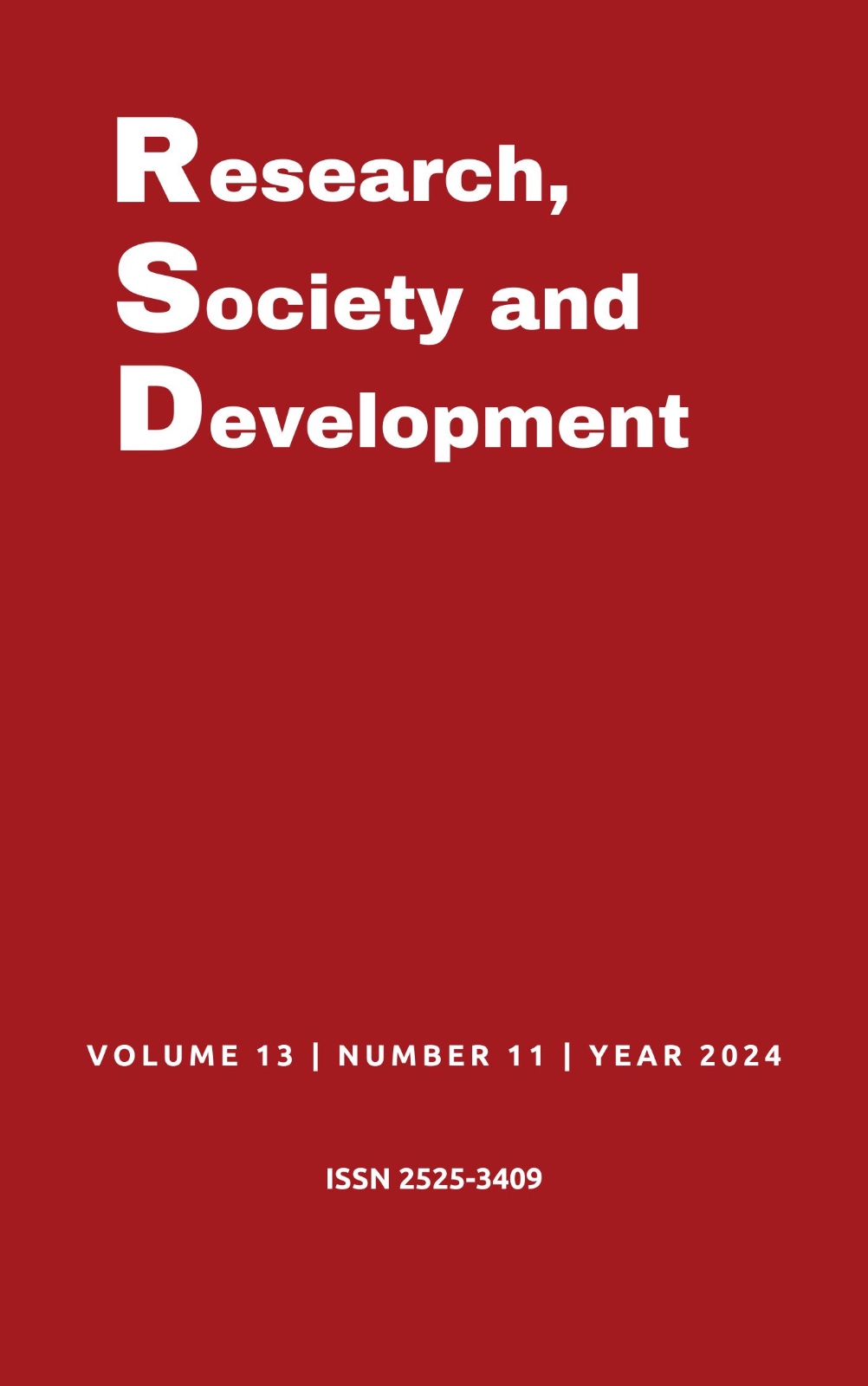Personal search and well-founded suspicion: Perception of first instance criminal courts of the judiciary of Alagoas in 2023
DOI:
https://doi.org/10.33448/rsd-v13i11.47267Keywords:
Personal search, Well-founded suspicion, Public security, Judiciary.Abstract
This research aims to present a study on the personal search procedure and the necessary founded suspicion as an instrument for promoting public safety. The research problem is to verify the perception of first instance criminal judges of the Judiciary of Alagoas regarding the characterization of founded suspicion in personal searches carried out by security agencies, which originated criminal proceedings in the year 2023. Regarding the technical procedures adopted, bibliographic, documentary and jurisprudential research was used. Regarding the objectives, this work can be defined as exploratory research. Regarding the approach to the problem, the research can be defined as quantitative, given the possibility of translating into numbers the number of decisions that analyzed and confirmed, judicially, the personal searches carried out by public security institutions under the allegation of founded suspicion. The scientific article also has an applied research nature, as it aims to generate knowledge aimed at providing a solution for possible abuses, in order to indicate the existing bodies and institutions with the power to monitor and hold accountable public agents who deviate from their conduct. After surveying the judicial decisions handed down, in 2023 alone, it was found that the characterization of well-founded suspicion was confirmed by the first instance magistrates of the Judiciary of Alagoas in 96.15% of the judicial statements analyzed.
References
Avena, N. (2018). Processo Penal. Rio de Janeiro: Forense, São Paulo: Método.
Brasil. (1941). Decreto-lei nº 3.689, de 3 de outubro de 1941. (1941). Código de processo penal. Brasília, DF: Presidência da República. https://www.planalto.gov.br/ccivil_03/decreto-lei/Del3689Compilado.htm
Brasil. (1988). Constituição da República Federativa do Brasil de 1988. (1988). Brasília, DF: Presidência da República. https://www.planalto.gov.br/ccivil_03/constituicao/ConstituicaoCompilado.htm
Brasil. (2022). Recurso em Habeas Corpus nº 158580 – BA. Superior Tribunal de Justiça [STJ], 19 de abril de 2022, Publicação no DJe/STJ nº 3377 de 25/04/2022(Brasil).https://processo.stj.jus.br/processo/julgamento/eletronico/documento/mediado/?documento_tipo=integra&documento_sequencial=151144910®istro_numero=202104036090&peticao_numero=&publicacao_data=20220425&formato=PDF
Brasil. (2023). Decreto nº 93.446, de 4 de setembro de 2023. (2023). Dispõe sobre a organização básica da Polícia Militar do Estado de Alagoas, e dá outras providências. Alagoas: DOAL. https://diario.imprensaoficial.al.gov.br/apinova/api/editions/viewPdf/37582
Brasil. (2024a). AgRg no Habeas Corpus nº 798072 - RS, Superior Tribunal de Justiça [STJ], 07 de outubro de 2024, Publicação no DJe/STJ nº 3969 de 09/10/2024. https://processo.stj.jus.br/SCON/GetInteiroTeorDoAcordao?num_registro=202300159369&dt_publicacao=09/10/2024
Brasil. (2024b). AgRg no Habeas Corpus nº 922728 - SP, Superior Tribunal de Justiça [STJ], 23 de setembro de 2024, Publicação no DJe/STJ nº 3960 de 26/09/2024 (Brasil). https://processo.stj.jus.br/SCON/GetInteiroTeorDoAcordao?num_registro=202402210974&dt_publicacao=26/09/2024
Brasil. (2024c). AgRg no Habeas Corpus nº 940718 - RO, Superior Tribunal de Justiça [STJ], 24 de setembro de 2024, Publicação no DJe/STJ nº 3963 de 01/10/2024 (Brasil). https://processo.stj.jus.br/SCON/GetInteiroTeorDoAcordao?num_registro=202403226458&dt_publicacao=01/10/2024
Brasil. (2024d). Habeas Corpus nº 933525 - SP, Superior Tribunal de Justiça [STJ], 01 de outubro de 2024, Publicação no DJe/STJ nº 3966 de 04/10/2024 (Brasil). https://processo.stj.jus.br/SCON/GetInteiroTeorDoAcordao?num_registro=202402853559&dt_publicacao=04/10/2024
Feferbaum, M.; Queiroz, R. M. R. (2019). Metodologia da pesquisa em direito : técnicas e abordagens para elaboração de monografias, dissertações e teses. São Paulo : Saraiva.
Lakatos, E. M. (2003). Fundamentos de metodologia científica. São Paulo: Atlas.
Lenza, P. (2022). Direito Constitucional. São Paulo: SaraivaJur.
Lima, R. B. de. (2022). Manual de processo penal: volume único. São Paulo: JusPodivm.
Lopes, A., Jr. (2022). Direito Processual Penal. São Paulo: SaraivaJur.
Medeiros, E. C. de. (2017). Abordagens policiais no município de Euclides da Cunha/BA: A discricionariedade no preenchimento dos requisitos legais e no registro das ações (Dissertação de Mestrado). Universidade Federal da Bahia. Bahia, Brasil. Recuperado em 20 outubro, 2024, https://repositorio.ufba.br/bitstream/ri/29817/1/DISSERTA%c3%87%c3%83O%20-%20ERNESTO%20CABRAL%20DE%20MEDEIROS.pdf
Moraes, A. de. (2023). Direito Constitucional. Barueri: Atlas.
Nucci, G. S. (2016). Manual de processo penal e execução penal. Rio de Janeiro: Forense.
Pacelli, E. (2018). Curso de processo penal. São Paulo: Atlas.
Polícia Militar de Alagoas [PMAL]. (2024). Anuário Estatístico 2023. Recuperado em 20 outubro, 2024, https://www.pm.al.gov.br/estatisticas?task=download.send&id=224&catid=27&m=0
Prodanov, C. C. (2013). Metodologia do trabalho científico: métodos e técnicas da pesquisa e do trabalho acadêmico. Novo Hamburgo: Feevale
Reis, A.C. A.; Gonçalves, V. E. R. (2019). Direito processual penal esquematizado. São Paulo: Saraiva Educação.
Silva, J. A. da. (2005). Curso de Direito Constitucional Positivo. São Paulo: Malheiros.
Zero Hora. (2023). Quando uma abordagem policial pode ser considerada ilegal: Tribunais de Justiça entendem que é preciso haver um fato objetivo que deixe a pessoa sob suspeita. Brasil. Recuperado em 20 outubro, 2024, de https://gauchazh.clicrbs.com.br/seguranca/noticia/2023/05/quando-uma-abordagem-policial-pode-ser-considerada-ilegal-clhv3ijl600d30165yjfrhvxp.html.
Downloads
Published
Issue
Section
License
Copyright (c) 2024 Weverton Luiz da Silva

This work is licensed under a Creative Commons Attribution 4.0 International License.
Authors who publish with this journal agree to the following terms:
1) Authors retain copyright and grant the journal right of first publication with the work simultaneously licensed under a Creative Commons Attribution License that allows others to share the work with an acknowledgement of the work's authorship and initial publication in this journal.
2) Authors are able to enter into separate, additional contractual arrangements for the non-exclusive distribution of the journal's published version of the work (e.g., post it to an institutional repository or publish it in a book), with an acknowledgement of its initial publication in this journal.
3) Authors are permitted and encouraged to post their work online (e.g., in institutional repositories or on their website) prior to and during the submission process, as it can lead to productive exchanges, as well as earlier and greater citation of published work.


